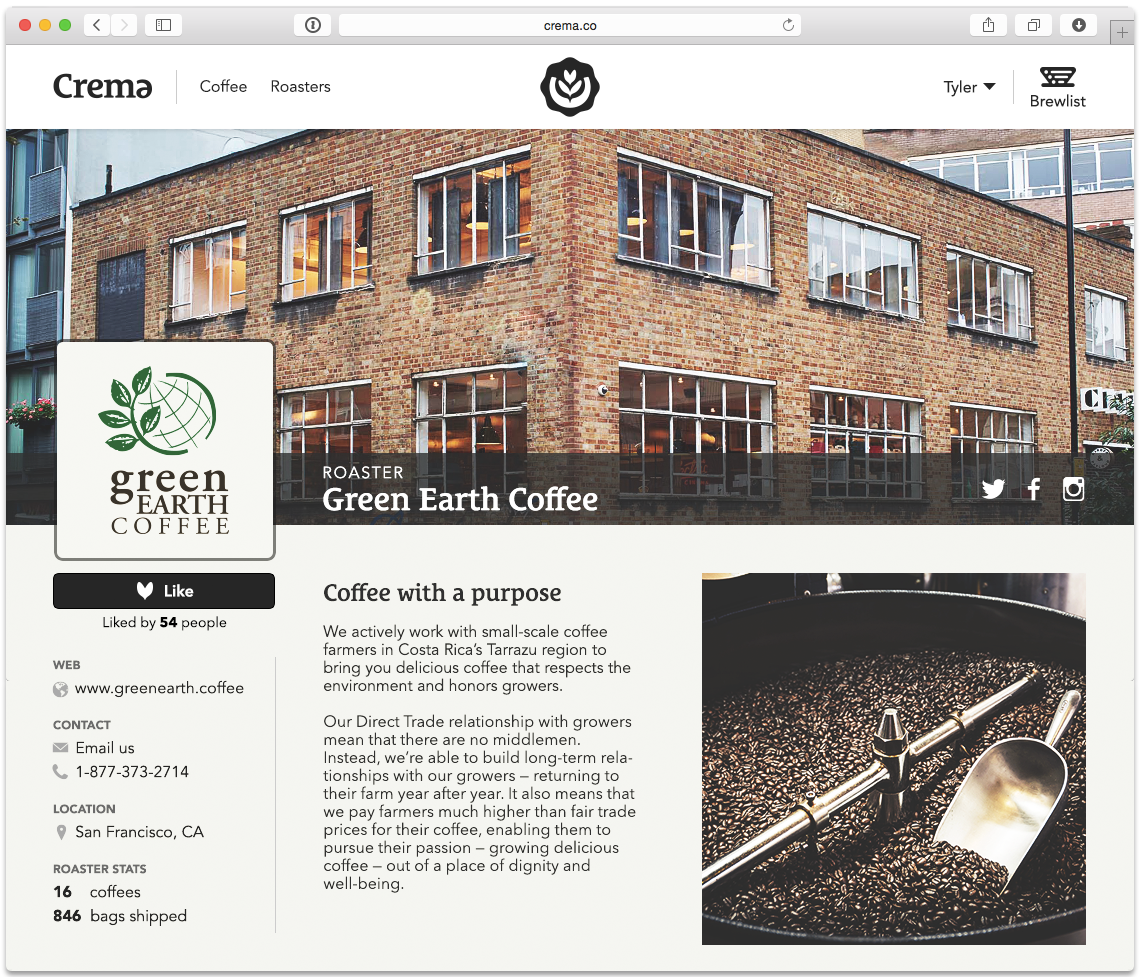[T]en years ago, Tyler Tate spent a summer working in Costa Rica with coffee farmers. Picking coffee, watching coffee processing, and participating in the coffee value chain from the grower’s side opened his eyes as a consumer, he says, but it was eight years later that the concept for Crema.co—a relationship-forward coffee subscription service—was born.
“I was at Flat White in London, and I went up to order my coffee. They had a blackboard behind the counter that described their coffee of the week. I think it was a Costa Rica Tarrazu, and the elevation, farmer name, and tasting notes were listed. That’s when I first thought how great it would be if there were an online marketplace where you could go and explore coffees based on those criteria. That’s my inspiration for Crema.co.” This emphasis on connection with coffee farmers and origin, as well as the unique structure of Crema.co (more on that in a moment), causes the subscription service to stand out from the ever-growing crowd.
Tate’s professional background is in design and technology. He specializes in making it easy for people to explore large amounts of information or products He’s worked with tech startups over the years, which situated him perfectly to build the Crema.co platform, set to launch sometime in Summer 2015.
“Crema.co is a place where independent coffee roasters can go to list their coffees for sale, and coffee drinkers can buy their coffees directly from the roaster,” says Tate. Many subscription services offer only one coffee, or buy coffees from roasters, repackage them, and mail them along to the subscribers. With a product like coffee where freshness is essential, the model is flawed—roasted coffee can be staling by the time the customer starts drinking it.
Tate is still establishing the standards for accepting roasters (he’s working with an un-named Q grader) but he emphasizes that there will be three tiers of guaranteed freshness for subscribers. “Top tier will be the coffee in the consumer’s hand within three days of roasting.” The other two tiers are slightly more relaxed in their shipping standards, and customers will have the chance to choose their preferred freshness level. Another standard for inclusion will be a focus on direct-trade coffee sourcing and single-origin offerings. Tate plans to keep the farmers front and center in the subscription through storytelling and dynamic content from roasters. He adds, “Another interesting aspect of Crema.co is our goal to engage consumers with the growers, and make coffee much more personal than it’s been for many.”
Crema.co will feature a “Brew List” similar to a Netflix queue: subscribers can choose their next coffees by a number of criteria, then indicate the frequency they wish to receive coffees, whether that’s every three days or every nineteen. There will be the chance to leave reviews on the roasters, and the coffees.
Taste, a commitment to freshness, and a willingness to put the grower front and center in storytelling are the criteria for roasters. For many roasters, who are accustomed to selling coffees at wholesale prices, the chance to list their coffees in a dynamic forum at retail prices, while paying twenty percent of the proceeds to Crema.co, offers higher margins and a new sales platform. Tate says, “Crema.co is basically a new sales channel for roasters to get their coffees in front of coffee consumers.”
The timing seems right for the market, with consumers increasingly learning about the coffee value chain and working to take charge of their coffee drinking, as well as an increasing number of micro roasters who are focused on quality and direct-trade sourcing. A recent Kickstarter campaign for Crema.co was successful, with the site picked as a Kickstarter Staff Pick, and featured in Food & Wine and other publications. Crema.co will roll out in the United States first, then the U.K. (Tate has lived in England for six years), then throughout Europe.
—Emily McIntyre is a regular contributor to Fresh Cup.


















